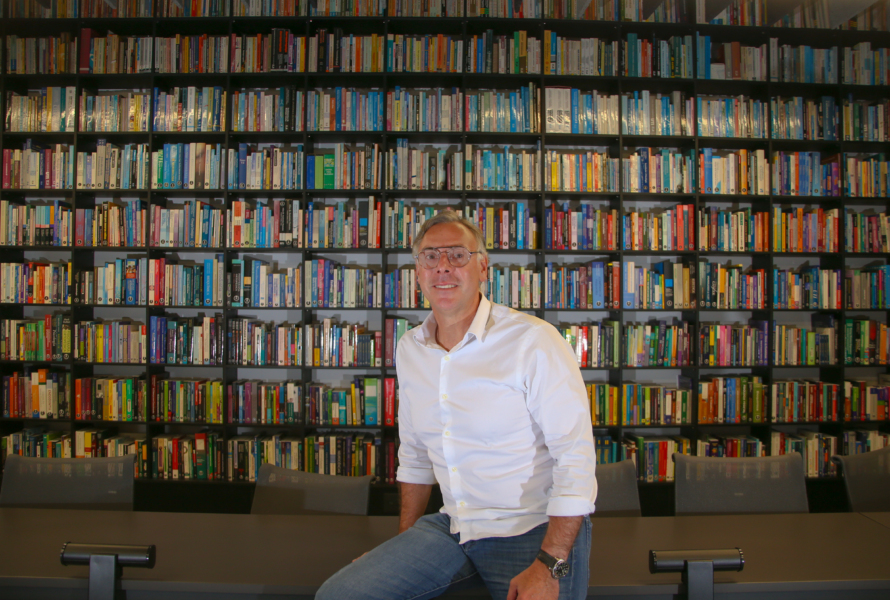
“In essence, we are a partnership company, working in specific markets, where reputation is very important.”
One of the most emblematic movements of entrepreneurs from family businesses, switching from CEO to chairman of the Board, represents a relevant decision in the organization's governance and has a significant effect on the leader's life and routine. A step that requires planning, clear and well-defined criteria, transparency, delimitation of responsibilities, among many other elements, this type of transition requires care with good practices and reputation management.
To bring some aspects of this movement, such as the repercussions on the organization's business and culture, the Reputation Feed sought out Celso Kiperman, executive charmain of the technical books and edtech publisher +Education, since March 2023. A good storyteller, in addition to being a leader who is passionate about what he does, he narrates his own trajectory as the protagonist of the transition in the group founded by his father, Henrique Leão Kiperman, who started selling books out of the trunk of his car and then created a publishing house in Porto Alegre, then called Artes Médicas, later Artmed, a reference in publications in the areas of medicine, psychology, education, administration, engineering, architecture, among others.
“The two main changes were to start listening more than talking and, mainly, asking questions instead of giving opinions. For me, what weighed heavily was the personal dilemma: how much I would miss the freedom of decision and action. As an individual, I am adapting. It is a growth, an evolution. For the company, it’s better”, says Celso, after 40 years in executive roles and 15 years as CEO of the group, which has already published over 4 thousand titles, reaches 3 million students in the higher education market and provides technological and content solutions to almost 500 universities in Brazil. “All the reputation that we have built, and which is materialized in our publications and our editorial labels, greatly facilitates dialogue and opens doors for us. On these shelves, somehow, this reputation is materialized. It’s a business done with great care and it’s well-received,” he says.
Below are excerpts from the interview:
LONELY BUT SUPPORTED DECISION
“The decision was a lonely one, but the moment I expressed it to my sister (Adriane Kiperman), she not only supported, but joined me and said: 'I want to leave my executive position and focus on my board position'. And what did we do? We created committees at both levels: executive and operational. Adriane, who was responsible for our editorial part, now participates in the Content Committee and in choosing what is perhaps the most vital part: the titles. She continues to lead the process, but no longer with executive responsibilities.”
THE TRANSITION
“We had already made a change in the organizational chart two years ago, in which the current CEO, Luiz Trivelato, occupied the position of COO, and the business was already with him. HR, Technology and Finance reported to me, but business – what I like most – was subordinate to him. I also realized that, for the company's governance, this movement would be better (no longer holding the positions of CEO and Chairman of the Board). The role I was in had some conflict of interest, because my vision and my role as an executive always prevailed. My biggest interest is as a shareholder. Now, having more exemption and distance, I can better organize the Council's agenda. The idea is for the Board to effectively help us build the company’s value.”
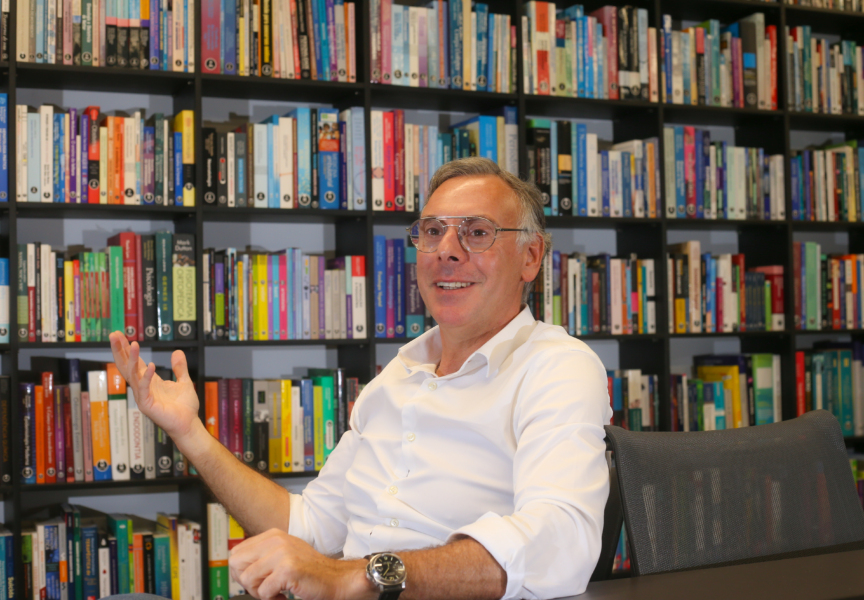
EFFECTS OF CHANGE
“The two main changes were to start listening more than talking and, mainly, asking questions instead of giving opinions. For me, what weighed heavily was the personal dilemma: how much I would miss the freedom of decision and action. As an individual, I am adapting. It is a growth, an evolution. For the company, it's better. What happened here? Immediately, I felt a breath of oxygenation and renewal. The company is 50 years old, it was founded by my father (Henry Kiperman), I started working 40 years ago. In the early 2000s, I was already the company's main leader. And today we have almost a thousand employees. I think employees didn't see the possibility of making a career here and reaching the number 1 position. This movement gives motivation and opens up a possibility.”
Duties of the executive chairman:
- Guardian of culture, principles and values;
- Guidance on the agendas of the Board of Directors and dialogue between shareholders, directors and executives;
- Participation in committees;
- Institutional relations;
- Mapping strategic opportunities
“As we have been active in the area of education for years, editorial labels end up giving credibility and security to our interlocutors. In all our approaches, our background as an editor is very important, it builds bridges for us, narrows our paths, reduces resistance.”
REPUTATION IN ESSENCE
“We have 2,200 active books and have already published 4,500 books, which means 4,500 contracts and, sometimes, with multiple authors (he speaks while looking at the thousands of copies arranged on the high shelves of the large meeting room at +A Educação headquarters). In essence, we are a partnership company, working in specific markets, where reputation is very important. We are very strong in content and technology. As we have been active in the area of education for many years, editorial labels end up giving credibility and security to our interlocutors. In all our approaches, our background as an editor is very important, it builds bridges for us, narrows our paths, reduces resistance, objections, gives people more peace of mind. We deal with people who are experts in their areas of expertise. We have been gaining work over the years. All the reputation that we have built, and which is materialized in our publications and our editorial labels, greatly facilitates dialogue for us and opens doors, such as, in a recent example, the partnership with universities. On these shelves, somehow, this reputation is materialized. It’s a business done with great care and it’s well-received.”
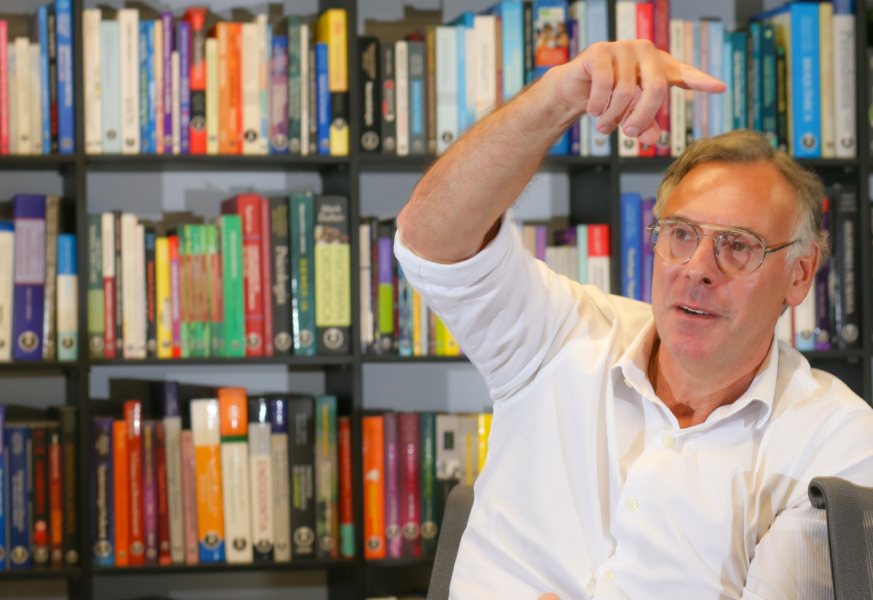
DREAM AND CONSOLIDATION
“In 2009, we received funding from BNDESpar, and in the end, an incredible opportunity arose with McGraw Hill, which at the time was one of the three largest publishers in the world, and due to the 2008 crisis, decided to divest from Brazil. And we managed to buy their operations in the country. That was a dream. My father, who started out selling McGraw Hill books out of the trunk of his car, somehow became the owner of McGraw Hill in Brazil. There is a video in which my father gives a statement: 'I feel like a scientist who won a Nobel Prize'. For him, it was the pinnacle of his career. That was important because it consolidated our publishing business and opened up another perspective for us.”
NEW PERSPECTIVES
“As partners with McGraw Hill, we began attending their sales conventions in the US. At the second convention I attended, the keynote speaker was the creator of Blackboard, Michael Chasen. When he finished speaking, I went to talk to him. Up until that point, we had already had a good relationship with university faculty, and I thought that with Blackboard, there would be a way for us to pave the way to universities. There was also the issue of reputation: I was a partner at McGraw Hill, a much larger company than Blackboard at the time, with revenues of US$1.4 billion. McGraw Hill was a company with revenues of US$1.4 billion. We were a bit lucky. It was 2010, Blackboard was the largest platform in the world, and here in Brazil, higher education was becoming more professional and consolidated. When the business was established, we acquired a startup from Santa Maria that worked with online education. We quickly managed to establish an appropriate pricing policy and began to have great success with Blackboard. That was how this new B2B journey with universities began. Institutions acquired the LMS, Blackboard’s virtual learning environment, but the virtual learning environment is infrastructure, and they needed content. Content has always been our calling and we created a content platform.”
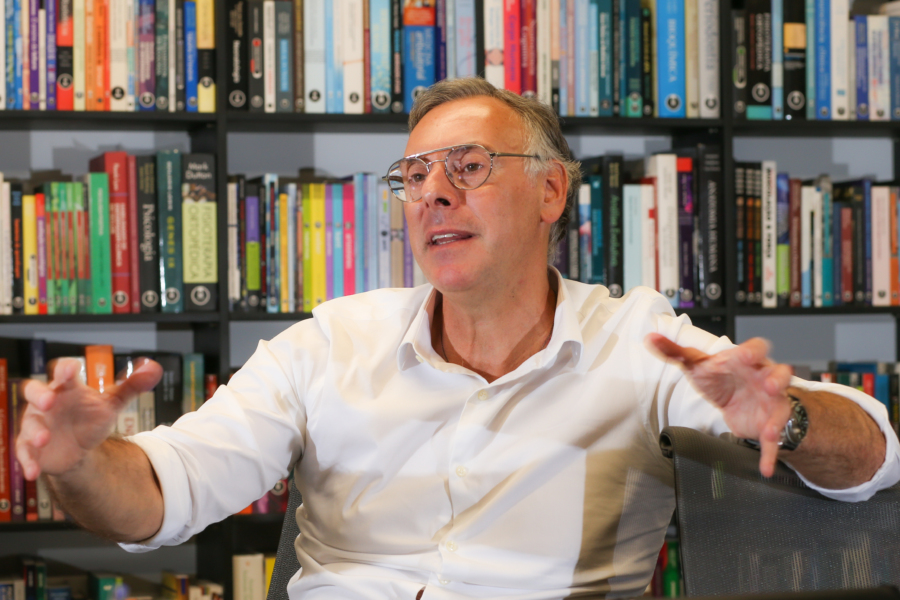
THE CLIMB
“We were adding products and initiatives to the portfolio with other companies. We think about making the business more complex, these strategic partnerships, using accumulated experiences making the platform available (edtech). We had all the expertise in developing content and knowledge and experience in selling continuing education programs. Today, we directly impact, with new solutions, and also, with our digital library, 3 million students in the higher education market in Brazil. We provide solutions to almost 500 universities.”
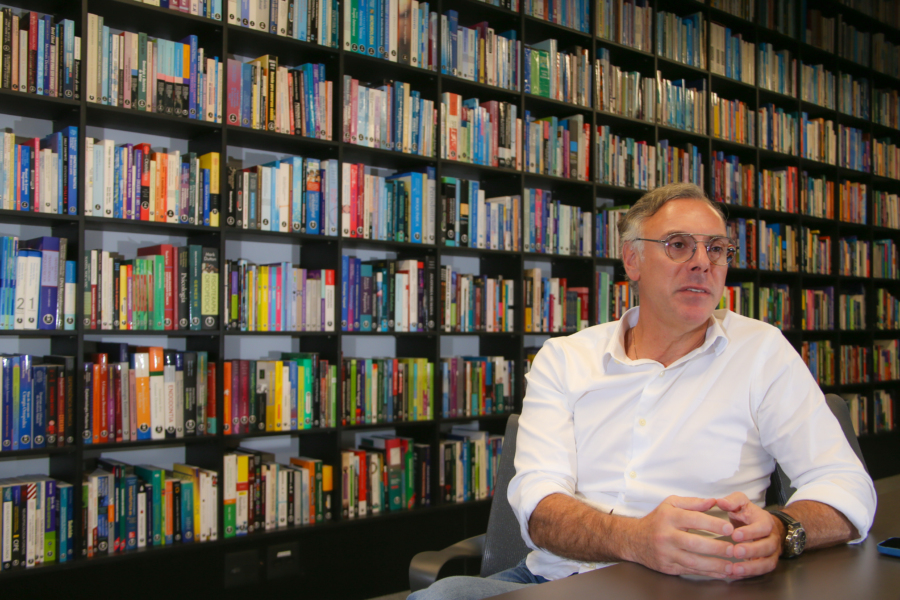
THE LEARNINGS
“In our desire to become an education company, we invested in a exam preparation company and another company focused on the agricultural market, which did not work. Some initiatives were frustrated, a bit trial and error.”
“After more than 10 years of partnership with Blackboard, which began in 2010, we are making a break because we have our technology. The partnership was important. We were a company that didn't know how to sell solutions, and they trained us in solution selling, sales force and inside sales. We created market access expertise that we didn’t have. We are very grateful for all these lessons learned.”
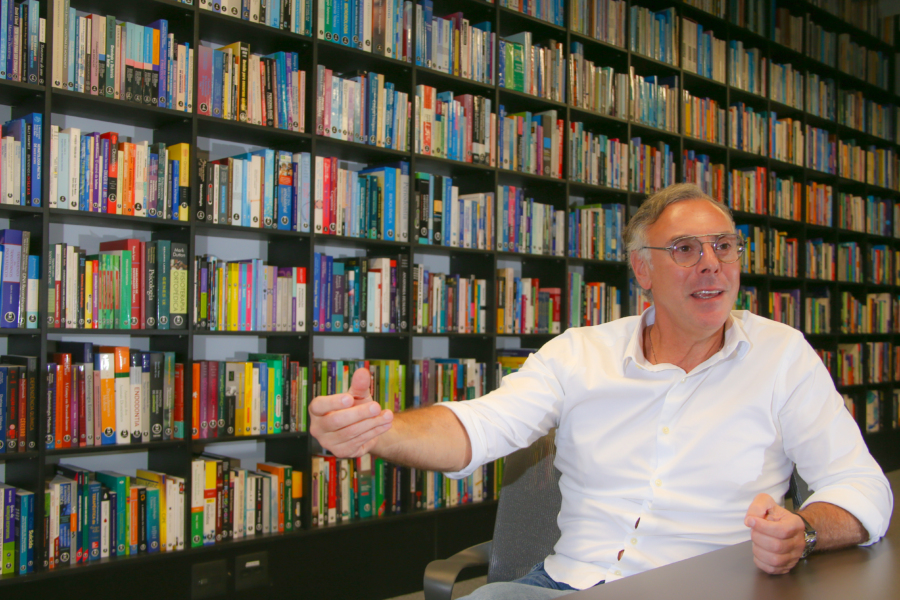
THE FATHER’S EXAMPLE
“The father was a curious figure. He said it was a Portuguese parrot, because he spoke little, but he thought it was crazy. We had a very close relationship, but he was one of few words. He never explained the business to me, but he put me to work, and then I learned. He gave me a lot of autonomy and perhaps greater responsibilities than I was capable of assuming at that time. At the age of 18, I made all the company's payments. I had the company check. And the company check meant the family check too, because the finances got mixed up. With this, I felt responsible and confident to undertake. We were always close partners, he had this thing about the entrepreneurial spirit, doing something well, taking great care with all the details.”
Christianne Schmitt is editor of the Reputation Feed
christianne.schmitt@ankreputation.com.br



